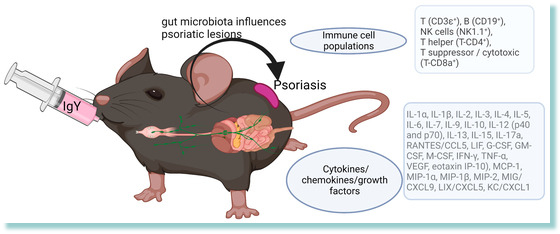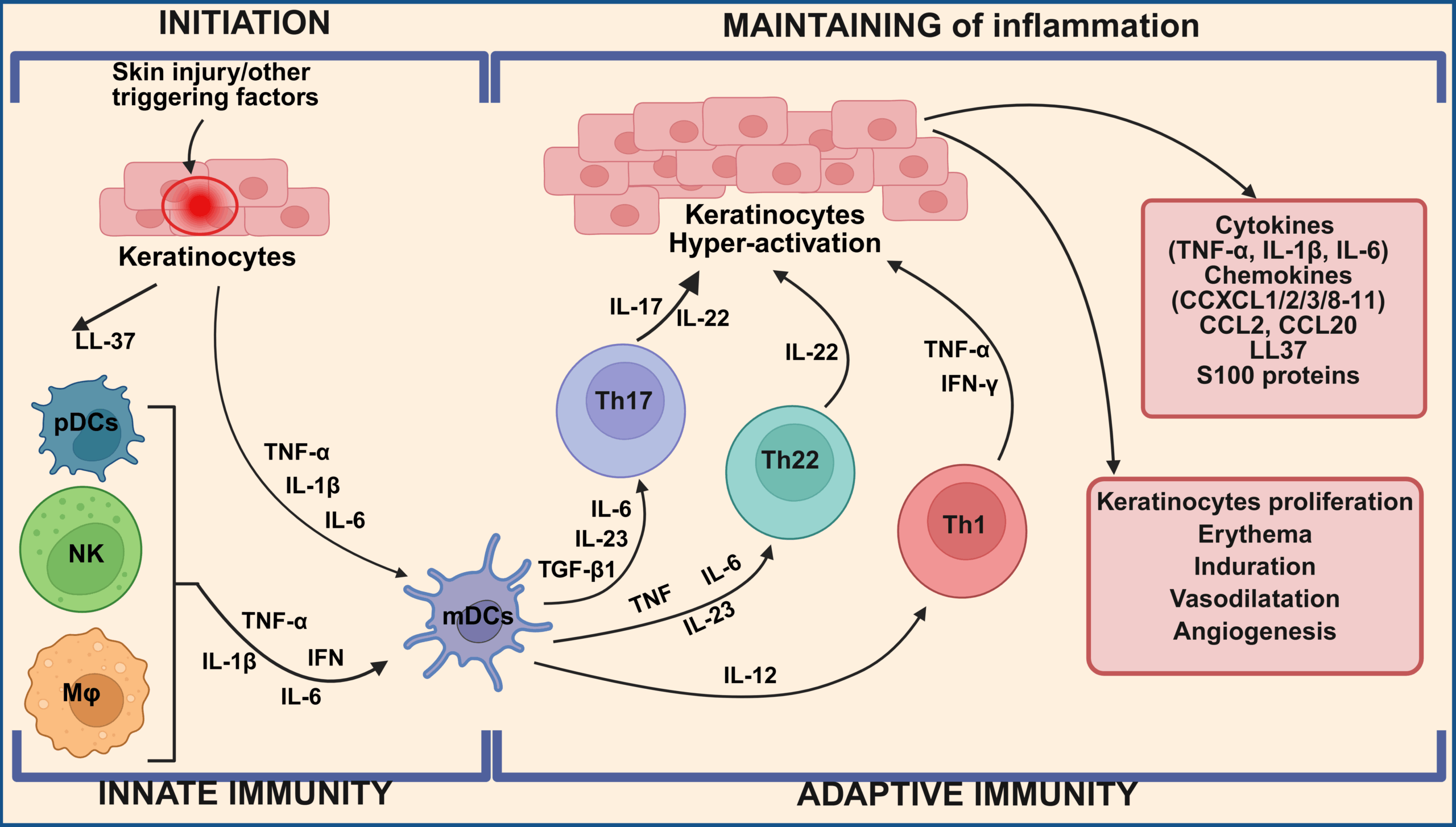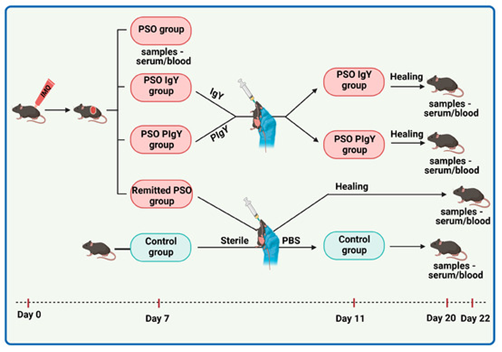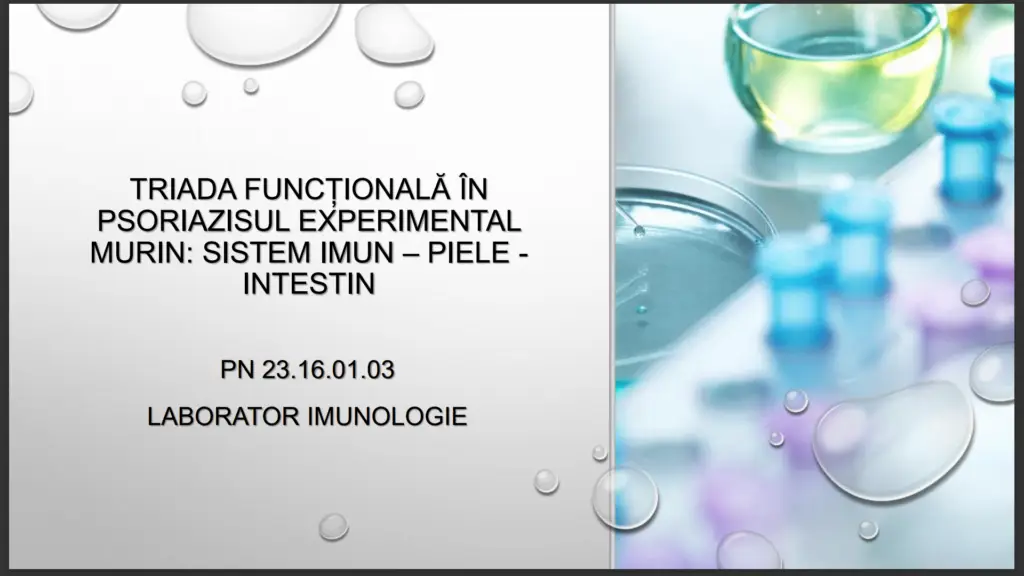PN 23.16.01.03
THE FUNCTIONAL TRIAD IN EXPERIMENTAL MURINE PSORIASIS: IMMUNE SYSTEM - SKIN – GUT
Duration: 2023 – 2026
Project responsible CSI Dr Carolina Constantin, Immunology Laboratory
Project objective
The main objective of the project is represented by the characterization of the functional mechanisms and the inter-systemic communication gut - skin - immune system in autoimmune diseases (experimental murine psoriasis) with the translation of the therapy validated in this preclinical study into human cases. Thus, the aim of the project is to identify pathogenic changes at the level of the functional triad gut - skin - immune system in experimental murine psoriasis, before and after adjuvant therapies. Thereby, the gut-skin-immune system triad defines a new concept with potential applicability in the elucidation of the molecular mechanisms involved in the pathogenesis of psoriasis and with impact in (personalized) therapeutic modulation.
Estimated results for achieving project objectives
To achieve the general objective of the project, the following will be considered:
- Evaluation of cellular immune status in acute and chronic murine experimental psoriasis (Ps).
- Proteomic investigation of the inflammatory syndrome in experimental Ps (acute and chronic)
- Immunological and proteomic modulation of the inflammatory syndrome in experimental Ps using unconventional therapies - treatment with the specific IgY protein component
- Immunological and proteomic modulation of the inflammatory syndrome in experimental Ps using unconventional therapies - hypocaloric diet.
- Evaluation and characterization of the dynamics of the murine microbiome (skin/gut) in the development of experimental Ps.
- Modulation of the microbiome (skin/gut) in murine Ps using unconventional therapies.
This research project aims to achieve the following targets at the end of the implementation period:
- Characterization of the inflammatory syndrome through a complex clinical / histopathological / immunological / proteomic approach of the experimental model of acute and chronic / transgenic Ps, before and after adjuvant therapies
- Characterization of the functional triad immune system - skin - intestine in experimental Ps before and after adjuvant therapies, with impact in diagnosis and therapy.
Phase I (2023)
Title: Evaluation of cellular and humoral immune status in acute experimental murine Ps
Phase objective: To achieve this objective, the experimental murine model of acute Ps induced by the application of Imiquimod (IMQ) cream was designed, and subsequently characterized from a clinical, histopathological and immunological point of view. For this experimental model, the main immune cell populations and subpopulations from the peripheral blood and spleen were investigated by flow cytometry in order to evaluate the cellular immune status. To evaluate the humoral immune status in acute murine experimental Ps, a wide panel of inflammatory cytokines possibly involved in the pathogenesis of Ps was tested. Also, the experimental murine model of acute Ps was characterized from a proteomic point of view, by quantifying circulating cytokines/chemokines.

Experimental design for characterizing cellular and humoral immune status in Ps
Phase main results
- The experimental murine model of acute Ps induced by applying IMQ-based cream to the dorsal region was developed and evaluated clinically, histopathologically, immunologically and proteomic.
- The progression of the disease and the severity of the induced inflammation were assessed based on in vivo measurements (for erythema, induration and desquamation), PASI score, splenomegaly and histopathological evaluation. The results obtained revealed that the experimental model of acute Ps developed presented specific characteristics of human Ps, being reproducible and functional.
- To evaluate the cellular immune status in experimental acute Ps, lymphocyte populations and subpopulations from peripheral blood and splenocyte suspensions were identified and quantified, revealing statistically significant changes for all investigated parameters.
- The analysis of the parameters of the cell in the peripheral blood showed decreased statistically significantly the values of the average percentage of lymphocytes T CD4 ++ a and B, in the case of the rats in group Ps vs the control group, and the increase was statistically significant, the values of the average percentage of the T-cell-CD8a+ - and NK-cells. For the ratio of T-CD4+T-CD8a+ they have been in decline, statistically significant values of the rats in group Ps than in the control group, as a result of the distribution of the subseturilor lymphocytes of the T in the peripheral blood.
- The distribution of cellular parameters in the spleen revealed a similar variation trend, except in the case of NK cells where a decrease in values was recorded in mice with Ps, and the differences obtained between the two experimental groups were statistically significant.
- To evaluate the humoral status in acute murine experimental Ps a broad panel of inflammatory cytokines possibly involved in the pathogenesis of Ps was tested to evaluate the changes in serum levels in IMQ-induced experimental Ps; statistically significant changes in circulating levels were obtained for IL-1α, IL-1β, IL-5, IL-6, IL-9, IL-10, IL-12 (p70), IL-13, IL-15, IL-17, IFN-γ, TNF-α, IP-10/CXCL10, MCP-1/CCL2, MIP-1α/CCL3, MIP-1β/CCL4, MIG/CXCL9 and KC /CXCL1.
- For pro-inflammatory cytokines (e.g. TNF-α, IFN-γ, IL-1β, IL-15, IL-17) and a series of chemokines (e.g. MCP-1/CCL2, MIP-1α/CCL3, MIP-1β/CCL4, KC/CXCL1, IP-10/CXCL10, MIG/CXCL9) significantly increased serum levels were obtained in Ps mice, compared to normals. A serum profile of inflammatory cytokines and chemokines involved in acute experimental murine Ps induced by IMQ was established.
Project dissemination (2023)
Communications at international and national conferences, with support from the project
EADV Symposium, 18-20 May 2023, Seville
- NK cells pattern in psoriasiform dermatitis animal model. Constantin C, Surcel M, Munteanu AN, Isvoranu G, Neagu M.. Constantin C, Surcel I'm personally a YEAR, Isvoranu, G, n. m. M.
- Circulating subsets of lymphocytes and dendritic cells in cutaneous melanoma. Surcel M, Munteanu AN, Constantin C, Isvoranu G, Neagu M
PDI 2023, 24-28 April, Iasi, Romania
- P! NK cell phenotypic changes in the tumor setting – the next level in melanoma immunotherapy/ Changes in the Phenotypic characteristics Of NK Cells – a New Approach to the Immunotherapy of Melanoma. Constantin C, Isvoranu, G, Surcel I'm personally a YEAR, Zurac S, Electrical.
Publised papers in ISI journals
- Insights into Nutritional Strategies in Psoriasis (2023). Constantin C, Surcel I, Personally, N. M. M., Nutrients 2023, To 15, 3528. DOI10.3390/nu15163528
- Immune Portrayal of a New Therapy Targeting Microbiota in an Animal Model of Psoriasis (2023). Surcel, M, Constantin C, Munteanu, A., Costea D., Isvoranu, G, Codrici E, Popescu, I, D, T, C, Ibram To, The Members, M. J. Pers. Avg. 2023, may 13, 1556. doi.org/10.3390/jpm13111556
Papers in the social sciences and with the support of the project
The congress of the University of Medicine and Pharmacy “Carol Davila”, Bucharest, 26-28 October, 2023 | Perspectives for Interdisciplinary research
- Immune portrayal of psoriasis dynamics in an experimental model. Michaela Surcel.
The homepage of the web project, PN23.16.01.03
It was carried out the project web page: https://www.ivb.ro/pn-23-16-01-03.
Phase II (2024)
Title: Evaluation of cellular and humoral immune status in chronic murine experimental Ps
Phase objective: To achieve this objective, an experimental murine model of chronic/systemic Ps was initiated by applying Imiquimod (IMQ) cream concomitantly with intraperitoneal IMQ injection. This model was characterized clinically, histopathologically and immunologically. The immunological characterization was based on flow cytometry quantification of the main immune cell populations and subpopulations in peripheral blood and spleen, thus evaluating the cellular immune status in chronic/systemic murine Ps. Also, for this experimental murine model, the dosage of circulating inflammatory cytokines/chemokines was performed
Phase main results
- The experimental murine model of chronic systemic Ps was established and evaluated clinically, histopathologically and immunologically. The progression of the disease and the severity of inflammation were assessed based on weekly in vivo measurements for erythema, induration and desquamation, PASI score, splenomegaly, hepatomegaly and histopathological evaluation. The results obtained revealed that the experimental model of chronic systemic Ps developed presented specific characteristics of human Ps, being reproducible and functional.
- Analysis of cellular parameters in peripheral blood revealed a statistically significant decrease in the mean % values of B lymphocytes in Ps mice vs. the control group. A decrease in the mean % values of T-CD8a+ lymphocytes and NK cells was observed, but without statistical relevance
- The distribution of the parameters of the cell in the spleen showed the decrease was statistically significant values of the average percentage of B-lymphocytes and NK-cells in the group of the Ps, chronic as compared to the control group. Also, there has been a reversal in the trend of the variation observed in the peripheral blood lymphocytes of the T-CD8a+for which he has been an increase in the values of the average percentage in the case of the mice in the group, the Ps process, but without statistical significance.
- Using protein microarray technology, a wide panel of inflammatory cytokines possibly involved in the pathogenesis of Ps was tested to evaluate changes in serum levels in experimental Ps induced by IMQ; statistically significant changes in circulating levels were obtained for both cytokines from the Th1 panel (e.g., IL-1a, IL-6, IL-15) and cytokines from the Th2 panel (e.g., IL-5, IL-10, IL-13). In addition, data on the profile of chemokines in the chronic inflammatory process of the skin (e.g., CCL11, MIP-1 gamma) focus the direction of the study also towards the subcategory of chemokines, emphasizing the need for a repositioning of their role in other pathologies - Ps than those where studies are more numerous (atopic dermatitis, allergies). Thus, the serum profile of inflammatory cytokines and chemokines in experimental chronic murine Ps-IMQ induced was established.
Project dissemination (2024)
Communications at international and national conferences, with support from the project
8th National Symposium with International Participation ARSAL, 29 March 2024, Bucharest
- The experimental model of psoriasiform dermatitis is characterized by major dysregulation of lymphocyte subpopulations, M, Surcel, The Munteanu G, Isvoranu, YES, Costea, e. g. Dobre, C, Constantine, M. Program, WHICH 2066-2599
PDI 2024, 16-19 April, Iasi, Romania
- NK cells phenotype in experimental psoriasis, Adriana Munteanu, Mihaela, Surcel, Sima Isvoranu, Carolina Constantin, Monica Neagu – poster
- Dynamics of immune parameters in experimental murine psoriasis, Michaela Surcel, Adriana Munteanu, Sima Isvoranu, Elena Georgiana Dobre, Carolina Constantin, Monica Is A Priority.
The 17th Edition of the National Congress of Cytometry, 16-17 May 2024, Bucharest
- Identification of IL-8 and TIMP2 as biomarkers of tumor progression and immune infiltration in cutaneous squamous cell carcinomas (CSCs) Georgiana Dobre, Munteanu, the YEAR of The Surcel, Carolina Constantin, Monica is a Priority.
7th European Congress of Immunology, 1-4 Sept 2024, Dublin
- Pro-inflammatory cytokine/chemokines pattern in obesity induced experimental psoriasis. Carolina Constantin, Mihaela Surcel, Adriana Narcisa Munteanu, Gheorghita Isvoranu, Neagu Teodora Monica. Carolina Constantin, Mihaela Surcel, Adriana Cecilia Munteanu, Gheorghita, Isvoranu, Monday, The Center Of Monica.
International Pathology Conference of the „Victor Babeș” Institute, 7-8 November, Bucharest
- Alteration of immune parameters in experimental psoriasis, M, Surcel, The Munteanu G, Isvoranu, G, No Person Is Codrici, Mr. Smith, Of Ibram, C, Constantine, M. Program
- Immunological investigation of functional immunodeficiencies with respiratory manifestations, He Didn't Munteanu M, Surcel, C, Constantine, M. Program
Publised papers in ISI journals
- Assessment of the RAS-RAF-MAPK Pathway Mutation Status in Healthy Skin, Benign Nevi and Cutaneous Melanomas: a Pilot Study Using Droplet Digital PCR , Person E. G., Stop L. A., Popp, C., Zurac, S., Frank, M., 2024. International Journal of Molecular Sciences, 25(4):2308, DOI:10.3390/ijms25042308
- Intercommunicating avenues cytokines networks in psoriasis. Michaela Surcel, Adriana Munteanu, Carolina Constantin, Monica Neagu, 2024, the Journal of Cell Identity, 3(1), 1-20, DOI: 10.47570/play the game.2024.006
- CAR-T Cells -Main Steps for Obtaining a Proper „Live Drug” Adoptive TherapyMonica Neagu, Carolina Constantin, 2024, The South East European Journal of Immunology, 7(1):13-20, DOI:10.3889/seejim.2024.6063
- Investigating the EGFR, BRAF and RAS mutations in oral and cutaneous squamous cell neoplasms: a preliminary report on the Romanian patients, Person, E. G. Caruntu, A., Munteanu, N. A., Surcel, M., Constantin, C., Caruntu C, Scheau, C., Frank, M., 2024. Romanian Journal of Military Medicine. DOI: 10.55453/rjmm.2024.127.5.2
Other information supporting the project
Immunology Lab personnel membership to the COST Network: The COST of the Action CA21108 European Network for Skin Engineering and Modeling NETSKINMODELS - promoter of future collaborations on the project topic

Ps pathogenesis: interrelationship of innate and adaptive immunity via cellular and humoral factors
Phase III 2025 (ongoing)
Title: Immunological and proteomic modulation of the inflammatory syndrome in experimental psoriasis using unconventional therapies
Phase objective: Evaluation of cellular and humoral immune status in experimental murine Ps treated with IgY isolated from hyperimmune egg. The experimental murine model of Ps induced by applying IMQ-based cream was established, and this model was subjected to an unconventional therapy - the IgY protein component isolated from the yolk of hyperimmune egg, from chickens immunized with antibiotic-resistant pathogenic bacteria. The experimental model was characterized from a clinical, histopathological and immuno-proteomic point of view. The main immune cell populations and subpopulations (from peripheral blood and spleen) were investigated and circulating inflammatory cytokines/chemokines were quantified, in order to evaluate the cellular and humoral immune status.

Experimental scheme regarding the further development of the project
Phase main results
- The experimental murine model of Ps induced by IMQ was developed and evaluated from a clinical, histopathological and immunoproteomic point of view, before and after treatment with the IgY protein component.
- To evaluate the cellular immune status in experimental Ps before IgY therapy, lymphocyte populations/subpopulations were identified and quantified in peripheral blood and splenocyte suspensions, with statistically significant changes for all investigated parameters.
- In peripheral blood, a statistically significant decrease in the mean % values of T-CD4+ and B lymphocytes was observed in mice with induced Ps vs. the Ctrl group, and a statistically significant increase in the mean % values of T-CD8a+ lymphocytes and NK cells.
- The analysis of the suspension of the splenocite found that the mice with the Ps, the indus script has been in decline, statistically significant values of % the average of the T-cell-CD4+A , B, and NK cells, with a significant increase in the values of the T-cell-CD8a+.
- Splenocyte suspension analysis revealed that for mice with induced Ps, statistically significant decreases in the mean % values of T-CD4+, B and NK cells were recorded, along with significant increases in T-CD8a+ lymphocytes.
- Serum cytokine analysis revealed significantly increased serum levels of IL-6, IL-1β, IFN-γ, TNF-α, IL-5, IL-10, IL-17, MCP-1 (CCL2), MIP-1α (CCL3), RANTES (CCL5), PF4 (CXCL4), ICAM-1, TIMP-1, leptin and eotaxin, in mice with induced Ps compared to healthy mice.
- For the experimental murine model of Ps induced by IMQ thus created and characterized, the effect of treatment with the IgY protein component on the evolution of the clinical condition, as well as the dynamics of the cellular and humoral immune status, was monitored.
- Following unconventional therapy - oral treatment with IgY - an improvement in the clinical evolution was observed, as well as a normalization of the investigated cellular and humoral parameters. As IgY can be prepared specifically and individually, this product could open a personalized field in the adjuvant therapy of Ps.
Project dissemination 2025 (ongoing)
Papers published in ISI journals
- Antibodies Against Melanoma Antigens – Clinical and Therapeutical Markers. Neagu M, Constantin C, Dobre E G a, Zurac, THE J Dermatol Res. 2025;6(1):1-22.
- Psoriatic stem cells and obesity: metabolic science for therapeutics. Constantin, C., Dobre, E. G., Munteanu, N. A., Surcel, M., Caruntu C, Zurac S, Frank M, J Med Life, 2025. (in the press)
Communications at international and national conferences, with support from the project
Conference Bioinformatics Horizons ‘25, Bucharest, Romania, April 2-4, 2025
- Assessing high-fat diet-induced gut microbiota changes in psoriasis mouse models: implications for developing novel therapeutic strategies, E.G. Dobre, P. Istvan, A.N. Munteanu, M. Surcel, G. Isvoranu, C. Constantin, M. Neagu
Cancer ImmunoTherapy & ImmunoMonitoring – CITIM, March 31 – April 3, 2025, Bucharest
- Adipokines and gut microbiome shape the outcome of cutaneous melanoma: preliminary insights, C Constantin, EG Dobre, AN Munteanu, M Surcel, SA Zurac, M Neagu
- Insights in genetic and epigenetic traits in cutaneous melanoma - new therapy targets, M Neagu, Dobre EG, Constantin C, Surcel M, Munteanu A, Zurac S.
PDI 2025, 7-12 April 2025, Iași, Romania
- New possible adjuvant therapies in experimental psoriasis, M Surcel, AN Munteanu, G Isvoranu, G Dobre, C Constantin, M Neagu..
- Mutational profiling in skin cancers, M Neagu, C Constantin EG Dobre, M Surcel, AN Munteanu, S Zurac
- Crosstalk between microbiome and immunity in cutaneous melanomaC Constantin EG Dobre, AN Munteanu, M Surcel, SA Zurac, M Neagu
Other information supporting the project: Immunology Lab personnel membership to the COST Network: COST Action CA21108 European Network for Skin Engineering and Modeling NETSKINMODELS - promoter of future collaborations on the project topic

